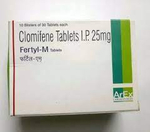clomit
Introduction to Clomit
Clomit is a medication primarily used in the treatment of infertility in women. It contains the active ingredient Clomiphene, which is known for its effectiveness in stimulating ovulation. This medication is often prescribed to women who have difficulty ovulating naturally, helping them increase their chances of conception. Clomit is available in tablet form, making it easy to administer orally. Its proven track record and accessibility have made it a popular choice among healthcare providers and patients seeking fertility solutions.
Composition of Clomit
The active ingredient in Clomit is Clomiphene, present in a 25mg dosage per tablet. Clomiphene works by stimulating the release of hormones necessary for ovulation to occur. It acts as a selective estrogen receptor modulator (SERM), which means it can either block or activate estrogen receptors in different tissues. In the hypothalamus, Clomiphene blocks estrogen receptors, tricking the body into thinking estrogen levels are low. This action triggers the release of gonadotropin-releasing hormone (GnRH), leading to increased production of follicle-stimulating hormone (FSH) and luteinizing hormone (LH), which are crucial for ovulation.
Uses for Clomit
- Treatment of ovulatory dysfunction in women desiring pregnancy.
- Induction of ovulation in women with polycystic ovary syndrome (PCOS).
- Assistance in diagnosing certain types of menstrual disorders.
- Used in controlled ovarian stimulation for assisted reproductive technologies.
Side Effects of Clomit
- Hot flashes
- Abdominal discomfort
- Nausea and vomiting
- Breast tenderness
- Headache
- Blurred vision or visual disturbances
- Mood swings
- Ovarian enlargement
Precautions of Clomit
Before starting Clomit, it is important to inform your healthcare provider about any existing medical conditions, especially liver disease, ovarian cysts not related to polycystic ovarian syndrome, or abnormal vaginal bleeding. Clomit should not be used in pregnant women. Regular monitoring by a healthcare professional is recommended during treatment to check for ovarian response and to adjust dosages if necessary. Patients should be aware of the potential for multiple pregnancies (twins or more) and discuss the risks with their doctor. Avoid driving or operating heavy machinery if you experience visual disturbances.
Conclusion
Clomit is a valuable medication for women struggling with infertility due to ovulatory dysfunction. With Clomiphene as its active ingredient, it effectively stimulates ovulation, increasing the likelihood of conception. While it is generally well-tolerated, patients should be aware of potential side effects and take necessary precautions under the guidance of a healthcare provider. Clomit’s availability in tablet form makes it a convenient option for those seeking fertility treatment.
Similar Medicines
Available in 2 variations

Clomit 50mg Tablet
Clomit 50mg Tablet
Clomiphene/Clomifene (50mg)
strip of 10 tablets

Clomit 25mg Tablet
Clomit 25mg Tablet
Clomiphene/Clomifene (25mg)
strip of 10 tablets
Related Posts

1:15
4 Amazing benefits of eating Lychee this summer!

1:15
Gond Katira: Nutrition and Benefits for a Healthier Life!

1:15
What Happens When You Use Marijuana? Find Out What You Need to Know!

1:15
Top 7 Amazing Health Benefits of Jackfruit!

1:15
Struggling with Thyroid Issues? How Does It Affect Women's Health?
Disclaimer : This information is not a substitute for medical advice. Consult your healthcare provider before making any changes to your treatment . Do not ignore or delay professional medical advice based on anything you have seen or read on Medwiki.
clomit
Prescription Required
Manufacturer :
Beulah Biomedics LtdComposition :
clomiphene/clomifene
















.svg)
